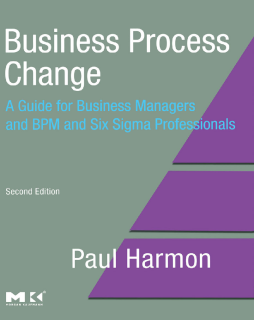
Additional Information
Book Details
Abstract
Every company wants to improve the way it does business, to produce goods and services more efficiently, and to increase profits. Nonprofit organizations are also concerned with efficiency, productivity, and with achieving the goals they set for themselves. Every manager understands that achieving these goals is part of his or her job. BUSINESS PROCESS MANAGEMENT (or BPM) is what they call these activities that companies perform in order to improve and adapt processes that will help improve the way they do business.
In this balanced treatment of the field of business process change, Paul Harmon offers concepts, methods, and cases for all aspects and phases of successful business process improvement. Updated and added for this edition are coverage of business process management systems, business rules, enterprise architectures and frameworks (SCOR), and more content on Six Sigma and Lean--in addition to new coverage of performance metrics.
* Extensive revision and update to the successful BPM book, addressing the growing interest in Business Process Management Systems, and the integration of process redesign and Six Sigma concerns.
* The best first book on business process, the most up-to-date book to read to learn how all the different process elements fit together.
* Presents a methodology based on the best practices available that can be tailored for specific needs and that maintains a focus on the human aspects of process redesign.
* Offers all new detailed case studies showing how these methods are implemented.
You’ve picked up the right book for just about any goal you have in process management. If you’re an enterprise process architect or manager, Harmon tells you what you need to think about and do at the enterprise level. If you are an owner or improver of a particular process, there’s an entire section devoted to managing particular processes. If you’re charged with using IT to support processes, you are similarly in luck. The book should be on the desk, in the briefcase, or on the bedside table of anyone who believes business processes are an important way to understand businesses and make them better.
From the foreword by Thomas H. Davenport, Director, Process Management Research Center, Babson College
Paul Harmon has done a great job updating his 2002 classic. BPM has changed significantly over the past 5 years and Paul has integrated those changes with the interrelationships of six sigma, lean, ERP, BPMS, SOA, and other enablers. Paul makes sense of the proliferation of BPM tools while recognizing the fundamental management changes that underpin them. As a result, this book is an excellent tactical reference for cross-functional teams to implement and sustain BPM as a platform for business transformation and to execute strategy.
-- George F. Diehl, Global Director, Process Management, Air Products and Chemicals, Inc.
Paul Harmon is without doubt the best informed and most trusted observer of all things BPM. True to form, in this book Paul provides a comprehensive and insightful summary of the current BPM landscape.
-- Geary Rummler, Founder & Partner, The Performance Design Lab., Coauthor Improving Performance
It’s a relief for process professionals to be able to move beyond theoretical BPM with case studies and find techniques and methodologies which provide great results in applied BPM. Paul Harmon’s writing has been an invaluable guide for me for several years, and his methodologies in combination with the open-standard framework based on SCOR®, benchmarking, and methodologies we have been using at Supply-Chain Council provide a complete end-to-end approach for organizations to take themselves not just to the next level, but to place themselves permanently on the top-level of performance. This is a must read for process professionals, whether you’re coming at it from “the business or “the IT side, a “Wade-Mecum for the Third-Wave Generation of process experts.
-- Joe Francis, CTO, Supply-Chain Council
Six Sigma plays a role in business process change -- but this role is often not well understood. Contrary to the proclamations of certain pundits, Six Sigma is not the be-all, end-all first and last word in process change. Nor is it an isolated tool used only for solving problems or optimizing performance within existing processes. It's more subtle than either of these extreme views, and it's critically important to get it right. Until now, no one has effectively addressed the role of Six Sigma in this larger context. But Paul Harmon hits it square-on. Every Six Sigma practitioner should read this book -- and better understand the nature of Six Sigma within the greater world of business process change.
-- Bruce Williams, Vice President & General Manager, BPM Solutions, webMethods, Inc. and coauthor of Six Sigma for Dummies and Lean for Dummies.
Harmon takes a clear-eyed look at the "movements", the standards, the strategies and the tactics and distills it into a clear picture of how to manage an agile business in the 21st century. As change accelerates and margins fall, this book becomes a must-read for survivors-to-be.
-- Dr. Richard Mark Soley, CEO, The Object Management Group (OMG)
